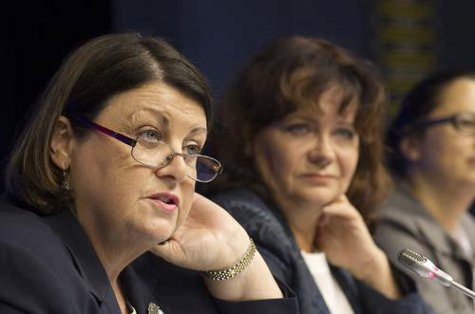 It has become increasingly difficult to kept a clear view on what exactly is discussed in the ongoing discourse on the various proposals and drafts for a European Patent with unitary effect (i.e. the Unitary Patent) and a Unified Patent Court.
It has become increasingly difficult to kept a clear view on what exactly is discussed in the ongoing discourse on the various proposals and drafts for a European Patent with unitary effect (i.e. the Unitary Patent) and a Unified Patent Court.
In order to retain a clear overview on the essential legal and political concepts of those two drafts, I extracted and sketched their main features based on the “Proposal for a Regulation [...] implementing enhanced cooperation in the area of unitary patent protection” dated 23 June 2011 (Document 11328/11) and the “Draft Agreement on a Unified Patent Court and draft Statute” dated 19 October 2011 (Document 15539/11). Please enjoy.
Yesterday I wrote a post reporting on the publication of EU Council Document 15539/11 conveying another version of the Draft agreement on a Unified Patent Court and draft Statute. Apparently there seems to be some political desire to get this thing done – together with Draft Regulations implementing enhanced cooperation in the area of unitary patent protection (Document 11328/11) – by finalising the entire package by end of this year.
To me it is quite a bit open as to whether or not this ambitious target will be met. We are amidst a grave stress test of the Euro framework, perhaps even of the EU itself. And, members of the political elites in all of the EU Member States are extremely busy to pretend as if they were aware of any viable solution advising how to exit this situation which perhaps might be reported in future textbooks of history as the worst crisis of the European Union ever. Will there be sufficient time and political will power to sort out problems in the field of patent law? I remember well the months of the French EU Presidency from July to December 2008. Up to September 2008 there had been strong hopes that French President Mr Sarkozy to take the bull at its horns and force a political compromise in the nasty languages issue concerning the original proposal for a EU Community Patent covering all of the EU Member States, including Italy and Spain. But on September 15, 2008, Lehman Brothers had to file for bankruptcy, and the world was no longer the same as it had used to be. The French Government had to shift their priorities, and Mr Sarkozy did not make it to push a compromise towards the EU Community Patent during his time at the helm of EU Presidency.
If the approach now pending – ‘enhanced co-operation’ – succeeds, what will be the practical consequences of its implementation?
Continue reading »
On October 19, 2011, the Polish EU Presidency has issued Document 15539/11 titled Draft agreement on a Unified Patent Court and draft Statute – Revised Presidency text. Changes in relation to the previous as provided with the version as of Document 15289/11 are marked. The provisions in italics marked with square brackets are still being developed as their final version depends either on the drafting technique to be adopted or on the content of the planned Commission proposal on changes to the acquis communitaire itself. Articles 14b and 14c now read:
Continue reading »
On October 07, 2011, the Polish EU Presidency has sent Document 15289/11 to the Delegations of the EU Member States for carrying on with negotiating an Agreement for a Unified Patent Court during a technical drafting session to be held from October 12-14, 2011 in Warsaw. The Document is titled Draft agreement on a Unified Patent Court and draft Statute – Revised Presidency text. In the Draft, changes in relation to the previous version (Document 13751/11 + COR 1) are marked. Concerning this elder version see also my earlier post here.
Altogether, the amendments made in Document 15289/11 compared to the previous version of document 13751/11 appear to be more or less of a technical nature. In particular, some conclusions from the non-paper Document 14191/11 titled Compatibility of the draft agreement on the Unified Patent Court with the Union acquis appear to have been drawn. In particular, a new Article 15b now defines the relation of the Unified Patent Court with the jurisdiction of courts of States not party to this Agreement (i.e. Italy and Spain) as follows:
(1) The Court shall have jurisdiction any time the court or courts of a Contracting Member State would have jurisdiction on the basis of Regulation (EC) 44/20019 or, where applicable, on the basis of the Convention on jurisdiction and the recognition and enforcement of judgments in civil and commercial matters (Lugano Convention).
(2) Where proceedings involving the same cause of action and between the same parties are brought in this Court and (a) court(s) of States not party to this Agreement, the Court shall of its own motion stay its proceedings until the jurisdiction of the court first seized is established.
(3) Where the jurisdiction of the court of a State not party to this Agreement is established, the Court shall decline jurisdiction in favour of that court.
Furthermore, a newly introduced paragraph 3 in Article 14c indicates that
The law of non-contracting States shall be applicable where relevant and as provided by provisions of Union law, in particular on the basis of Regulations 593/2008 (Rome I) and 864/2007 (Rome II), or by international instruments.
I expect to get further news next week after the technical drafting session to be held in Warsaw is closed.
 According to Chapter II PCT (International Preliminary Examination) the International Preliminary Examination Authority (IPEA) draws up the International Preliminary Examination Report (IPER) which is forwarded to the elected national patent Offices upon national phase entry. Since most national Offices use the IPER as a basis for their substantive examination, it is vital for the applicant that a positive IPER is established.
According to Chapter II PCT (International Preliminary Examination) the International Preliminary Examination Authority (IPEA) draws up the International Preliminary Examination Report (IPER) which is forwarded to the elected national patent Offices upon national phase entry. Since most national Offices use the IPER as a basis for their substantive examination, it is vital for the applicant that a positive IPER is established.
Based on Rule 66.4 PCT, reading
Additional Opportunity for Submitting Amendments or Arguments:
(a) If the International Preliminary Examining Authority wishes to issue one or more additional written opinions, it may do so, and Rules 66.2 and 66.3 shall apply.
(b) On the request of the applicant, the International Preliminary Examining Authority may give him one or more additional opportunities to submit amendments or arguments.
the EPO now announced an important procedural change for international applications entering Chapter II PCT before the EPO functioning as IPEA (see Notice from the EPO dated 31 August 2011). According to that revised practice, the EPO obtains discretion to issue additional written opinions before establishing the IPER, either on its own initiative or upon applicant’s request. This will give applicants more control and influence and better chances to enter the national phase with a positive IPER.
Yesterday the EPO News channel reported on a “renewed commitment to cost-efficient European patents” by the EPO and the European Commission. As nobody really had the slightest doubts on the continued and strong support by the project’s two main driving forces, this “news” does not sound that confident and persuasive as it apparenty was intended.
I cannot help, but to me it sounds more like political PR language or even autosuggestion if the President of the EPO, Benoît Battistelli, and the European Commissioner for the Internal Market and Services, Michel Barnier, jointly confess that “the unitary patent is [...] expected to simplify procedures and lower the costs for applicants by up to 70%“.
As reported by Reuters, representatives of Governments of eight nations, namely Japan, the United States, Australia, New Zealand, Canada, Morocco, South Korea and Singapore have signed ACTA on October 01, 2011 in Tokyo. A number of signatories involved in ACTA negotiations, including the European Union, abstained. This does, however, not mean that EU dissociate themselves from the Agreement – there are merely formal obstacles which have to be removed before a signature on behalf of the EU can be given. As reported earlier on this blog, preparatory work of EU Council is underway to sign and ratify ACTA. For further background, see also here.
Continue reading »
Compatibility Of Draft Agreement On Unified Patent Court with EU acquis
On September 20, 2011, the General Secretariat of the Council of the European Union has filed Document 14191/11 titled Compatibility of the draft agreement on the Unified Patent Court with the Union acquis. It was classified “LIMITE” but after having filed a request on the basis of Regulation (EC) No 1049/2001 of the European Parliament and of the Council regarding public access to European Parliament, Council and Commission documents and the specific provisions concerning public access to Council documents set out in Annex II to the Council’s Rules of Procedure (Council Decision No 2009/937/EU, Official Journal L 325, 11.12.2009, p. 35) the General Secretariat has come to the conclusion that I may have access to this document. Hence, I expect this Document to become accessible in the Register very soon.
The Document conveys a non-paper from the Commission services who have analysed the compatibility of the draft agreement on the Unified Patent Court (UPC) with the Union acquis. In particular, they have checked the Draft against:
- Regulation (EC) No 44/2001 on jurisdiction and the recognition and enforcement of judgments in civil and commercial matters (Brussels I)
- The Convention on jurisdiction and the recognition and enforcement of judgments in civil and commercial matters (Lugano Convention)
- Regulation (EC) No 593/2008 on the law applicable to contractual obligations (Rome I) and Regulation (EC) No 864/2007 on the law applicable to non-contractual obligations (Rome II)
- Regulation (EC) No 1206/2001 on cooperation between the courts of the Member States in the taking of evidence in civil or commercial matters
- Regulation (EC) No 1393/2007 on the service in the Member States of judicial and extrajudicial documents in civil or commercial matters
- Directive 2004/48/EC on the enforcement of intellectual property rights
As a general result the Commission services concluded that the relationship between the Brussels I Regulation and the draft agreement on the Unified Patent Court should be clarified in a particular way as suggested in the paper. The Commission services furtherrecall that the revision of the Brussels I Regulation is ongoing before the co-legislators. In addition, changes to the draft UPC Agreement should be made. It does not appear that issues of compatibility with other Union instruments would arise. A technical analysis of each of the provisions of the draft UPC Agreement should continue. It is clear that many procedural matters will need to be regulated in the rules of procedure.1 It is obvious that such rules will also need to comply with the relevant Union legislation. The UPC Agreement should clearly provide for this and foresee a mechanism how such compliance with the acquis may be ensured.
Continue reading »

Ms Máire GEOGHEGAN-QUINN, Member of the European Commission; Ms Barbara KUDRYCKA, (right) Polish Minister of Science and Higher Education
The EU Competitiveness Council met in Brussels on Thursday 29 and Friday 30 September under the chair of Mr. Marcin Korolec, Deputy Minister of Economy, and Mrs Barbara Kudrycka, Polish Minister of Science and Higher Education. Below please find a quote from recent MEMO/11/643:
Draft Agreement on the creation of a Unified Patent Court
The European Commission and the Polish Presidency are giving high priority to patent reform. The objective is to reach agreement on a new patent system by the end of the year.
In that context, intensive work has been done to find agreement among the Member States on the basic features of the Unified Patent Court. Currently, patent litigation in Europe is fragmented and expensive. National patent courts only decide on the validity of European patents in their own territory. A patent owner needs to start court proceedings in a number of different courts in order to enforce his European patent for the same invention throughout Europe. This creates unnecessary costs as well as legal uncertainty.
To address these issues, a draft agreement for the setting up of a Unified Patent Court was developed between 2007 and 2009. However, in its Opinion in March 2011, the Court of Justice of the European Union (CJEU) raised concerns in respect of certain aspects of the draft agreement.
In May, the Commission tabled a working paper on the way forward. The paper addressed the concerns of the CJEU and met the expectations of Member States and industry. The solution suggested by the Commission was examined and endorsed by the Member States at the May Competitiveness Council. On that basis, the Hungarian Presidency tabled a revised draft agreement in June. This will be discussed at tomorrow’s meeting.
Commissioner Barnier will welcome progress made in recent weeks and stress the importance of reaching a final agreement by the end of 2011. He will highlight that reducing the costs and complexity of the existing European patent system has a substantial impact on innovation and growth.
The result was described in Document 14691/11 – PROVISIONAL VERSION – PRESSE 331 PR CO 55 as follows:
Continue reading »
The k/s/n/h::law blog
Some of the patent attorneys of the KSNH law firm have joined their efforts to research what is going on in the various branches of IP law and practice in order to keep themselves, their clients as well as interested circles of the public up to date. This blog is intended to present results of such efforts to a wider public.
Blog Archives
- November 2013 (2)
- October 2013 (1)
- September 2013 (1)
- August 2013 (2)
- July 2013 (3)
- June 2013 (5)
- March 2013 (5)
- February 2013 (4)
- January 2013 (5)
- December 2012 (5)
- November 2012 (5)
- July 2012 (5)
- June 2012 (8)
- May 2012 (5)
- April 2012 (3)
- March 2012 (4)
- February 2012 (5)
- January 2012 (6)
- December 2011 (12)
- November 2011 (9)
- October 2011 (9)
- September 2011 (4)
- August 2011 (7)
- July 2011 (4)
- June 2011 (1)
Blog Categories
- business methods (6)
- EPC (7)
- EPO (12)
- EU law (92)
- ACTA (8)
- CJEU (4)
- Comitology (1)
- competition law (2)
- Enforcement (6)
- EU Unified Patent Court (62)
- FTA India (1)
- TFEU (2)
- Trade Marks (5)
- European Patent Law (37)
- German Patent ACt (PatG) (1)
- German patent law (5)
- Germany (6)
- Pirate Party (3)
- International Patent Law (4)
- PCT (2)
- IP politics (10)
- licenses (2)
- Litigation (5)
- Patentability (7)
- Patents (12)
- Piratenpartei (2)
- Software inventions (10)
- Uncategorized (9)
- Unitary Patent (24)
- US Patent Law (4)
Comments
- kelle on Germany: Copyright Protection More Easily Available For Works Of “Applied Arts”
- Time Limits & Deadlines in Draft UPCA RoP: Counting The Days - KSNH Law - Intangible.Me on Wiki Edition of Agreement on Unified Patent Court Agreement (UPCA)
- Time Limits & Deadlines in Draft UPCA RoP: Counting The Days | ksnh::law on Wiki Edition of Agreement on Unified Patent Court Agreement (UPCA)
- Wiki Edition of Agreement on Unified Patent Cou... on Wiki Edition of Agreement on Unified Patent Court Agreement (UPCA)
- European Commission Takes Next Step Towards Legalising Software Patents in Europe | Techrights on EU Commission publishes Proposal of amendend Brussels I Regulation for ensuring Enforcement of UPC Judgements
Blogroll
- 12:01 Tuesday
- America-Israel Patent Law
- Anticipate This!
- AwakenIP
- BlawgIT
- BLOG@IPJUR.COM
- BP/G Radio Intellectual Property Podcast
- Broken Symmetry
- Class 46
- Director's Forum: David Kappos' Public Blog
- Gray on Claims
- I/P UPDATES
- IAM Magazine Blog
- Intellectual Property Intelligence Blog
- IP Asset Maximizer Blog
- IP CloseUp
- IP Dragon
- IP Watch
- IP Watchdog
- IPBIZ
- ipeg
- IPKat
- ITC 337 Law Blog
- Just a Patent Examiner
- K's Law
- MISSION INTANGIBLE
- Patent Baristas
- Patent Circle
- Patent Docs
- Patently Rubbish
- PatentlyO
- Patents Post-Grant
- Reexamination Alert
- SPICY IP
- Tangible IP
- The 271 Patent Blog
- The Intangible Economy
- THE INVENT BLOG®
- Think IP Strategy
- Tufty the Cat
- Visae Patentes
The KSNH blogging landscape


This blog and the German-language sister blog k/s/n/h::jur link to the two popular and privately run blogs IPJur und VisaePatentes and continue their work and mission with a widened scope and under the aegis of our IP law firm.
ksnhlaw on Twitter
- No public Twitter messages.
 KSNH::JUR Feed (german)
KSNH::JUR Feed (german)- Ist Verschlüsselung passé? September 6, 2013Auf verschiedenen Feldern beruflicher Praxis ist dafür zu sorgen, dass Kommunikation vertraulich bleibt. Die trifft beispielsweise für Ärzte zu, aber auch für Anwälte, darunter auch Patentanwälte. Einer der zahlreichen Aspekte, die in diesem Zusammenhang eine Rolle spielen, ist die Technik, um die Vertraulichkeit beruflicher Kommunikation sicherzustellen. Wa […]
- EU-Einheitspatent: Demonstrativer Optimismus und Zahlenmystik allerorten – Naivität oder politische Beeinflussung? June 26, 2013Nach mehreren vergeblichen Anläufen zur Schaffung eines EU-weiten Patentsystems wurde 1973 als Kompromiss das Europäische Patentübereinkommen unterzeichnet, welches unabhängig von der seinerzeit noch EWG genannten Europäischen Union System zur zentralisierten Patenterteilung mit nachgeordnetem Einspruchsverfahren durch das Europäische Patentamt schuf. Wie wi […]
- Moderne Zeiten oder: DPMA und Patentgericht streiten über die elektronische Akte April 25, 2013Bekanntlich hat das Deutsche Patent- und Markenamt (DPMA) im Jahre 2013 mit der rein technischen Fertigstellung der Einrichtungen zur elektronischen Akteneinsicht einen wichtigen Meilenstein seines Überganges von der Papierakte zur “elektronischen Akte” erreicht. Im DPMA werden aber bereits seit dem 01. Juni 2011 Patente, Gebrauchsmuster, Topografien und erg […]
- Gutachten zu Forschung, Innovation und technologischer Leistungsfähigkeit Deutschlands 2013 March 11, 2013Unter dem Datum vom 28. Februar 2013 ist die Bundestags-Drucksache 17/12611 veröffentlicht worden Sie trägt den Titel Unterrichtung durch die Bundesregierung - Gutachten zu Forschung, Innovation und technologischer Leistungsfähigkeit Deutschlands 2013. Die Bundesregierung legt dem Deutschen Bundestag seit dem Jahr 2008 […]
- 3D-Printing: Zum Filesharing von 3D-Modelldaten February 25, 2013In meiner kleinen zuvor angekündigten Reihe über rechtliche Aspekte des 3D Printing komme ich heute auf die Frage zu sprechen, ob die Hersteller von Gerätschaften es hinnehmen müssen, wenn Ersatztreile davon – vom Brillengestell über Smartphone-Gehäuseteile bis hin zu Rastenmähermotor-Abdeckungen – gescannt und die daraus […]
- Ist Verschlüsselung passé? September 6, 2013






